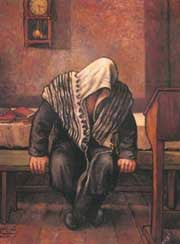Prayer is called many things in the Torah. Jacob has an "encounter" on Mount Moriah; Pinchas conducts a "judgment" with G‑d; Isaac and Rebecca "entreat" for a child; Jonah "cries out" from the belly of the fish. The Midrash surveys the Five Books of Moses, the Book of Psalms and the Prophets, and finds 13 ways to say "prayer": cry, howl, groan, stricture, song, prostration, encounter, judgment, entreaty, standing, appeal and beseeching.
Of course, no two people cry alike. Judgment can be the judgment of self, of our place in the world, or of our relationship with G‑d. And certainly the tone and timbre of our prayers varies with the time and place of our beseeching, the reason for our entreating, and the object of our appeals. Thus each of the thirteen modes of prayer include numerous colors and textures, as we have attempted to demonstrate with this selection of 28 stories, essays and articles, culled from 125 issues of Chabad.Org Magazine.
Stories of Prayer:

|
The Chassid and the Fool at the Leiptzig Fair

|
Voices of Prayer:

|
Essays on Prayer:

|
Prayer Insights:







Prayer After reading the post and comments, I felt some insight was in order. First of all, it does not matter what words you use to describe how you pray because prayer should be done with the understanding you are talking to G-d and how you think at a particular time. You can cry out one day and laugh to G-d the next. Praying is not about just what we need or want, or at least it should not be the only thing. Prayer is our conduit to an inner relationship with our Heavenly Father. Speak to Him about everything. Praying the prayers in a Siddur are a basic outline to help you remember to Bless G-d and thank Him for everything, but it should not stop there. Rabbinical thought is for 100 prayers a day. In other words, talk to G-d regularly throughout your day. Sure we can pray for what we want and need, but let's remember prayer also includes asking for the needs and wants of others, thanksgiving, blessing, and general conversation. The Torah has many examples for us to see.